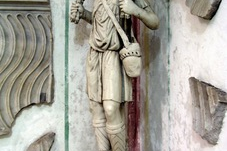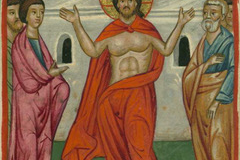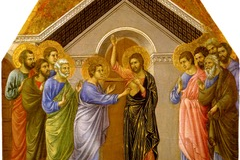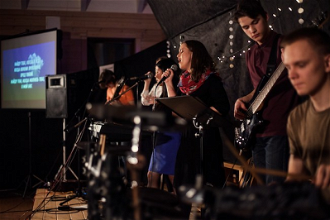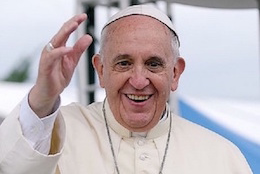Sunday Reflection with Fr Robin Gibbons - 6 May 2018
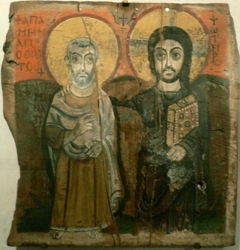
Sixth Sunday of Easter
Then Peter proceeded to speak and said: "In truth, I see that God shows no partiality. Rather, in every nation whoever fears him and acts uprightly is acceptable to him. (Acts 10:34-35)
Would you consider yourself to be one of God's friends? It's not the sort of question I have asked myself very often, but it does enter my thoughts and prayers from time to time, especially when I think about the many good, holy people throughout history who have by life and example made a difference, enriched the standing of the children of Adam and Eve a little. For me these are the people of every race and belief who show love towards others, towards creation and particularly towards those we would classify as enemies, persons who show evil and harm towards others.
The whole discussion about sin, evil and forgiveness is central to our life as Christians, it is at the heart of our own calling by Christ who urges each one of us to forge friendships, forgive others and in his great commandment to: "love one another as I love you. No one has greater love than this, to lay down one's life for one's friends". (Jn 15:12-13) But that brings me back to wonder about the nature of friendship with God. For me that small term, 'friend of God' carries a whole manner of things with it.
Too often I have heard religious figures talk (or write) about God in terms of a distant, unknowable, even aggressively angry being. You know what I mean, it's the language people use against each other, especially in terms of polemical discussion, but it can enter into our ordinary faith life by disagreements and debate. The old second world war cartoon, 'Carless talk costs lives' should be an icon for each one of us, in the sense that unthinking, aggressive or half thought out statements, especially about matters of faith, can easily turn people away from religion, even in the sense of losing their connection with God. This is not how God's friends behave!
In the book of Acts, Peter reminds us all that the living God seeks out each and everyone of us, 'no partiality' Peter says! He does not define how that relationship is understood, like any friendship, that of our own with God is something that grows, is almost indefinable in quantifiable terms but links to who we are, for it is about acceptance and the willingness to stay alongside each other no matter what may come. Friendship with God begins in that gracious image of God walking with his friends in the cool of that garden in the tale of creation. It reaches its climax in the love Jesus shows to us by calling us not servants or members of a Church or even brothers and sisters, but friends rooted in Him. As Graham Green wrote, "Friendship is something in the soul. It is a thing one feels. It is not a return for something."(Greene. The Heart of the Matter) It is God's initiative, let us accept it with joy!
Lectio Divina
"And what is a friend? More than a father, more than a brother: a traveling companion, with him, you can conquer the impossible, even if you must lose it later. Friendship marks a life even more deeply than love. Love risks degenerating into obsession, friendship is never anything but sharing. It is a friend that you communicate the awakening of a desire, the birth of a vision or a terror, the anguish of seeing the sun disappear or of finding that order and justice are no more. That's what you can talk about with a friend. Is the soul immortal, and if so why are we afraid to die? If God exists, how can we lay claim to freedom, since He is its beginning and its end? What is death, when you come down to it? The closing of a parenthesis, and nothing more? And what about life? In the mouth of a philosopher, these questions may have a false ring, but asked during adolescence or friendship, they have the power to change being: a look burns and ordinary gestures tend to transcend themselves. What is a friend? Someone who for the first time makes you aware of your loneliness and his, and helps you to escape so you in turn can help him. Thanks to him who you can hold your tongue without shame and talk freely without risk. That's it."
From: The Gates of the Forest by Elie Wiesel.
Fr Robin Gibbons is an Eastern Rite Catholic Chaplain for Melkites in the UK. He is also an Ecumenical Canon of Christ Church, Oxford.



